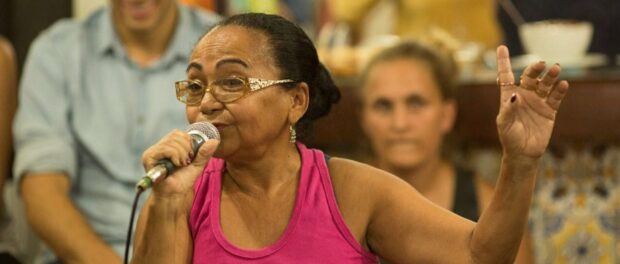
For the original article in Portuguese by Xico Sá published by El País click here.
“You’ll have to forgive me, I am ‘unlearned,’ but now I have come to like to say things, to tell my story,” said domestic worker Lindacy Menezes, 64, revealing her discovery of literature. Raised by a brothel owner in Recife, the Pernambuco native has lived in the favela of Rocinha, Rio de Janeiro, since the 1970s. She was one of the most animated voices at an event for the project, “You Are What You Read,” on Thursday, February 1, in the Garagem das Letras (Garage of Letters), a cultural center for residents of the Rio community.
“Unlearned, not knowing what a text was, what a poem was,” continued Menezes, before performing her verses for the audience. The event’s guest of honor, journalist and writer Zuenir Ventura, author of Cidade Partida (Divided City)—a modern classic about violence in Brazil—listened attentively to the prosody, and likened her to a great Brazilian writer when he commented: “This is Guimarães Rosa!”
The girl raised in the cabaret of Recife’s port is a first-rate storyteller. Five years ago, she heard about a workshop for the Urban Peripheries Literary Festival (Flup) and decided to send some lines in to compete for a spot. She dictated “some nonsense” to her daughter—she didn’t know how to use the computer—and was selected. “After this, I have not stopped and I will never stop again.” Wait for the book with the saga of this woman. I will be in the line for autographs.
I participated in the “You Are What You Read” event in the company of writer-comedian Gregório Duvivier and actress Maria Ribeiro. The Rocinha edition was one of the most moving in the event’s three years. It was more like, “You are what you hear.” There is a hunger to tell stories in that setting, where many of the alleys and lanes are stained with blood. Blood of very young people. Boys trapped between the police and criminals. It is necessary to tell one’s own story so we don’t rely only on the official incident reports. To live is the right to narrate.
Michele Dias, an attentive witness to the happenings in Rocinha, recalled the case of her uncle Amarildo, a bricklayer who went missing in July of 2013, after being taken by Military Police to the Pacifying Police Unit (UPP). For three months, the State tried to assert many fictitious narratives. In October, prosecutors revealed what the entire favela had been trying to say: that Amarildo had been killed by the police.
Another work of fiction by the State, with the help of the department of municipal lies, relates to the operation of the state-funded Park Library. Opened in 2012, inspired by and modeled after reading centers in Bogotá and Medellín (Colombia), the library closed its doors in community members’ faces last year. The alleged reason is a lack of resources to pay the employees. Mayor Crivella, during a visit to the favela, promised to reopen the building in partnership with the state Secretary of Culture. It was only empty preaching, for a change.
Librarians told of the devastating effect of closing this cultural space that had united hundreds of residents, attracted by books, DVDs, the theater, the recording studio, the Internet, the cooking school, etc. A social disaster, they summed up. Yet another tragedy of Rio and Brazil. Money for bullets to exterminate youth from the peripheries—it is always good to keep in mind—is never lacking.
As if singing Chico Buarque’s lyrics—”the pain of the people does not appear in the newspaper“—Rocinha is a sea of stories and wants to tell its own version of events. Thank you, Lindacy, for your lessons in existence. Oh, if all of the so-called ‘learned’ were like you.
